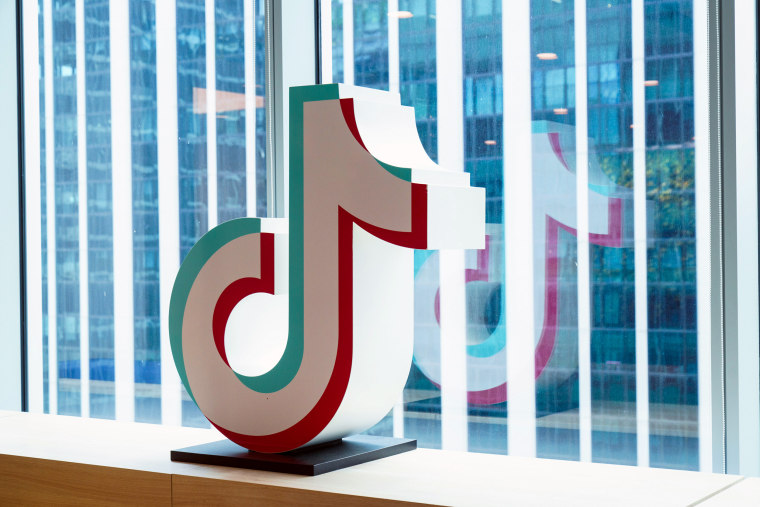David Ingram

A new report from the Network Contagion Research Institute says that TikTok likely promotes and demotes certain topics based on the perceived preferences of the Chinese government.
The group, an independent research organization composed of psychologists, engineers and analysts at Rutgers University, analyzed the volume of posts with politically sensitive hashtags on TikTok versus on its rival Instagram.
The institute’s researchers, who are known for previously publishing an analysis showing a rise in insurrectionist hashtags leading up to the Jan. 6 attack on the U.S. Capitol, said that they believe TikTok is likely manipulating public debate not only on China-specific topics, such as the 1989 Tiananmen Square protests and massacre, but also on strategically important topics with less direct ties to China, such as the wars in Ukraine and the Gaza Strip. TikTok is owned by a Chinese company, ByteDance.
“We assess a strong possibility that content on TikTok is either amplified or suppressed based on its alignment with the interests of the Chinese Government,” the report states.
The researchers compared hashtag performance to the average performance of pop culture hashtags, such as #TaylorSwift and #CristianoRonaldo. They found that there were 2.2 posts on Instagram with a top pop culture hashtag for every one such post on TikTok.
That baseline ratio of 2.2-to-1 made sense, they said, because Instagram has a bigger user base than TikTok.
Then, they ran a similar analysis for politically charged hashtags and said they found lopsided differences. For every one TikTok post with a hashtag supporting Ukraine, there were 8.5 such posts on Instagram — a significant discrepancy from the baseline ratio and one that dovetails with China’s support of Russia, the researchers said.
The difference was starker on other subjects, the researchers said. For the hashtag #HongKongProtests, there were 206 posts on Instagram for every one on TikTok, they said. The topic is especially sensitive to the Chinese government because it refers to that city’s pro-democracy demonstrations.
And the dynamic was reversed for some hashtags friendly to the Chinese government, researchers said. Posts tagged #StandWithKashmir are more numerous on TikTok than on Instagram by a ratio of 661-to-1, a dramatic overrepresentation, researchers said. That aligns with China’s strategic interest in the disputed Kashmir region that straddles India, Pakistan and China, the report said.
“It is challenging to imagine that activity of such magnitude could occur on a platform organically, and without the knowledge and consent of the platform itself,” the researchers wrote of the volume of Kashmir posts.
In a statement to NBC News, a spokesperson for TikTok, which looked at a copy of the institute's report before it was published, said the institute’s report used flawed methodology to reach a predetermined, false conclusion.
“It fails to take into account the basic fact that hashtags are created by users, not by TikTok,” the company said. “Most importantly, anyone familiar with how the platform works can see for themselves the content they refer to is widely available and claims of suppression are baseless.”
Before the report was published Thursday, the institute removed an example from the report of Covid-related hashtags. Those hashtags were relatively rare on TikTok versus on Instagram but that’s because TikTok banned them for causing anti-Asian violence.
Regarding the “China Virus” hashtag, a spokesperson for TikTok said that it "is blocked on TikTok because it was widely recognized as hate speech that was fueling violence."
"That this fact was ignored not only speaks to the shortcomings in this report, but is also deeply ironic coming from an organization purportedly dedicated to combatting hate speech online," the spokesperson said.
A spokesperson for Meta, which owns Instagram, did not respond to a request for comment.
Hashtags are just one of many metrics on social media, and cultures on different platforms vary by the populations attracted to them, but the researchers from the Network Contagion Research Institute said the pattern of anomalies that they observed was too clear to ignore or to be easily explained by organic factors.
“Across topics directly sensitive to the Chinese Government, relevant hashtags are dramatically underrepresented on TikTok vs. Instagram,” they wrote.
They also said their methodology replicated methodology that TikTok itself used last month in addressing claims that its recommendation algorithm is biased in favor of Palestinians. Though the institute is headquartered at a university, its reports aren’t peer-reviewed like articles in an academic journal.
TikTok acknowledged that it also used hashtags in its Nov. 13 blog post to measure content on its platform versus Instagram.
But a spokesperson for TikTok said in a statement that "suggesting that this report employed TikTok's methodology is false, and we have repeatedly made clear that comparing hashtags is an inaccurate reflection of on-platform activity."
Hashtags about domestic U.S. politics generally did not show anomalies from the baseline, the researchers said. For every post on TikTok with the hashtag #Trump, there were 2.2 such posts on Instagram, and for the hashtag #BLM (Black Lives Matter), the ratio was similar at 1-to-1.9.
The analysis was published at a crucial time for TikTok, as politicians and technologists have ramped up their criticism of the popular video app. Its critics argue that a Chinese-owned social media platform is a privacy risk for Americans’ personal information and a potential source of foreign propaganda, possibly justifying a ban.
TikTok has pushed back on the criticism, saying that its recommendation algorithm doesn’t take sides on issues and that the company is willing to make accommodations for Americans’ privacy, such as by storing data in U.S.-based servers.
Last month, a federal judge blocked a Montana law banning TikTok from going into effect, ruling that the ban likely violates the First Amendment’s guarantee of free speech.
No comments:
Post a Comment